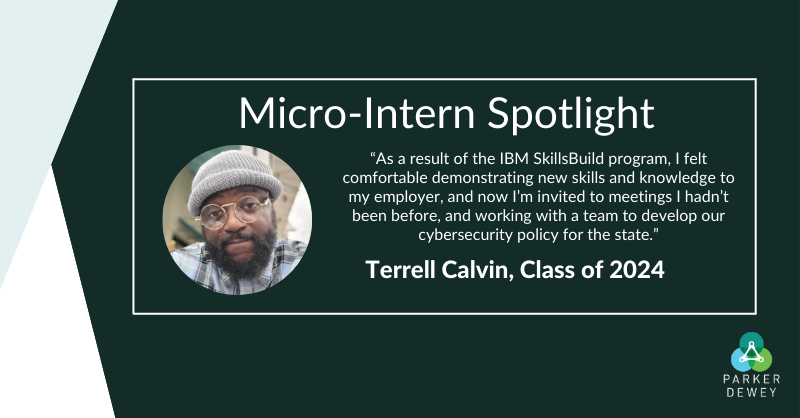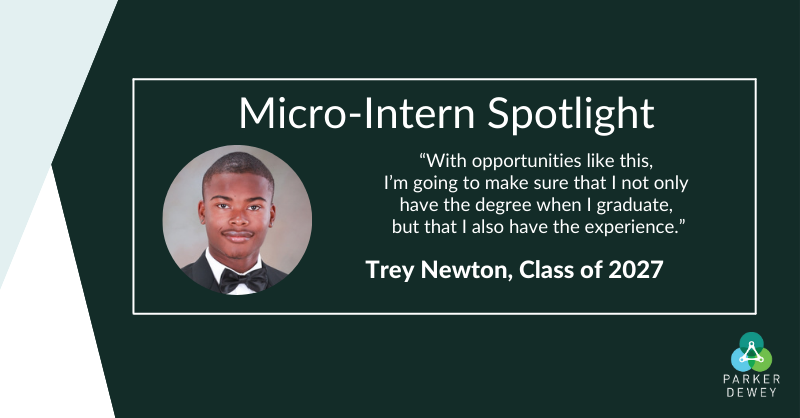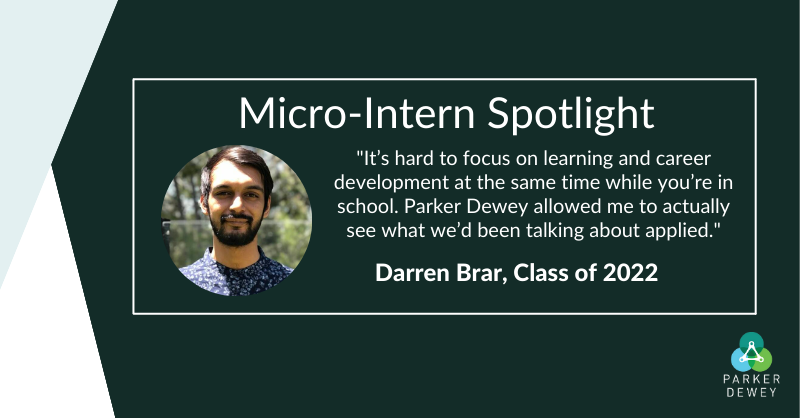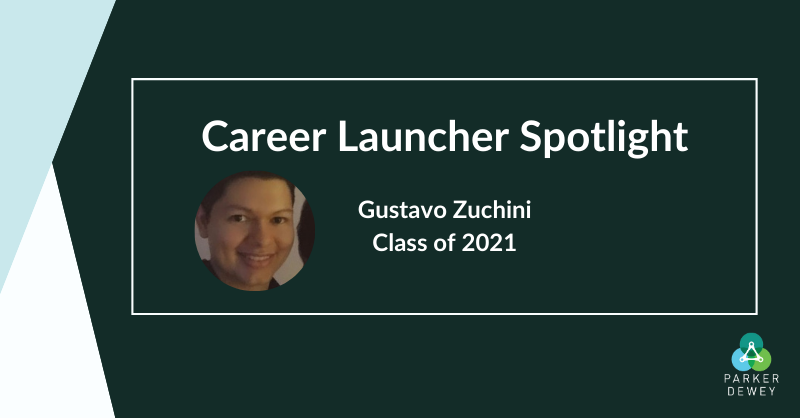
Building Skills with IBM
The innovative IBM SkillsBuild Micro-Internship program is a unique collaboration between higher education and industry, focused on the workforce readiness of individuals from historically underrepresented backgrounds. The positive impacts for learners can be seen firsthand in the experience of students like Terrell Calvin, a first-generation veteran pursuing his doctorate in Public Policy at Southern University and A&M College, a Historically Black College and University (HBCU). Through this unique program, students like Terrell who have completed IBM SkillsBuild badges in AI, cybersecurity or data analytics are able to apply their training to real-world projects. These paid Micro-Internship projects, posted on the Parker Dewey platform and funded by IBM, are posted by companies that have an interest in engaging with early-career talent to hire for technical roles.
The Appeal of IBM SkillsBuild Micro-Internships
Terrell, who has completed three IBM SkillsBuild projects, and a fourth Parker Dewey Micro-Internship outside of the IBM program, has been a fan of IBM SkillsBuild for years, having completed his first training in 2021. Since then, he’s completed SillsBuild tracks in Artificial Intelligence, Cybersecurity, Internet of Things, and Data Science.
Even more impressive, Terrell completed these tracks as he was not only studying for his doctorate, but also working full time as a Help Desk and IT Manager and teaching a Software Applications for Business Majors course. All those responsibilities make for a jam-packed schedule, which is why Terrell jumped at the opportunity to put the skills he’d learned through IBM SkillsBuild to use through Micro-Internships.
“I really wanted to get more hands-on experience, but I’m already working a 40-hour work week and I knew anything I was going to do needed to be outside of those typical hours… The amount of time each Micro-Internship took was manageable and could fit in my schedule. The ability to be remote, and communicate through email or virtual meetings, turned out to be perfect!”
Applying New Skills to Real Projects
Terrell enthusiastically threw himself into multiple AI research projects, confident that the research skills he’d built in his doctoral program, combined the the AI knowledge he’d picked up through IBM SkillsBuild, would serve him well. While he’d always been interested in AI, these Micro-Internships were Terrell’s first opportunity to work with it.
“Working in IT, I’d obviously heard of AI, and a lot of my research is rooted in Artificial Intelligence, but I didn’t have any real-world experience with it before these projects. I’m actually getting real-world experience with these Micro-Internships.”
Terrell also appreciated the variety across the Micro-Internships, allowing him to better understand a wider range of use-cases for the new technology. In one Micro-Internship, Terrell explained, he was tasked with looking for identifiers of AI tools that fit into certain categories, helping the company better understand different ways in which AI can be used. For another project, however, the company was focused specifically on how they could use AI in their business model to establish a stronger presence for their start-up. All the Micro-Internships have focused on AI research, but from varying perspectives and with unique goals.
“The experiences I’ve had have come from all different sectors, ranging from an entrepreneur and their start-up to a Fortune 500 company focused on understanding jobs in the future that may involve AI. They’re all rooted in Artificial Intelligence, but from widely different perspectives, and they all have real deliverables. I get to figure out how to help them solve their problems.”
As he spoke about his experiences, Terrell repeatedly highlighted that these Micro-Internship projects were the difference between learning something in theory and actually applying it.
Benefits to Future Research and Opportunities
The timing and content of Terrell’s Micro-Internships also have come at a perfect time for his doctoral pursuits. Despite never having had real-world AI experience before these projects, much of Terrell’s research is rooted in studying the dynamics and evolution of Artificial Intelligence as well as the United States response in terms of policy.
Terrell’s research regularly reminds him of what a complex landscape the world of AI is, and he is grateful for the ‘nuggets of information’ his Micro-Internship experiences have allowed him to add to his studies.
“[These projects] helped me understand how to really evaluate certain functions and capabilities of these tools, and the already-realized and potential challenges behind implementation. It’s all new information that I can add to my study… I’m getting to pull from real, personal experiences, and that’s putting me ahead of the game.”
Others have also taken notice of the experience Terrell has gained from Micro-Internships, and are opening new doors for him as a result. Academically, his dissertation chair has used these experiences as support in their nomination of Terrell for a fellowship, and Terrell himself has highlighted the experiences in his application to a prestigious internship focused on AI.
In his current full-time role, Terrell’s colleagues and supervisors have also been made aware of Terrell’s recent experiences, which has allowed him to make the case for new responsibilities, like implementing a chatbot. Terrell shared that because this task is so related to the knowledge he’s gained through IBM SkillsBuild, and the experience he’s built through the resulting Micro-Internships, his employer is comfortable with Terrell taking on this task.
The chatbot isn’t the only exciting project Terrell is getting to tackle because of his IBM SkillsBuild efforts. His supervisors have also taken note of the cybersecurity track he completed, and are having him contribute to new initiatives in that arena.
“As a result of the IBM SkillsBuild program, I felt comfortable demonstrating new skills and knowledge to my employer, and now I’m invited to meetings I hadn’t been before, and working with a team to develop our cybersecurity policy for the state.”
When asked if he thought he would have had these assignments without the IBM SkillsBuild program, Terrell was confident that the training and Parker Dewey Micro-Internship experiences were key to getting to tackle these new opportunities. He shared that much of his full-time role focuses on system analysis, and without the IBM program, there wouldn’t have been an opportunity for him to learn and demonstrate the skills necessary to convince his employer he could take on these projects.
Advice for Companies
As evidenced by Terrell’s experience, Micro-Internships have been a great way for him to demonstrate skills and abilities that employers, including his own, wouldn’t have otherwise known about, and Terrell encourages other companies to give early career talent that chance with Micro-Internships.
“I think companies really find value in engaging students with a range of academic backgrounds and skills. This is a really efficient and effective way to basically interview someone to see if they’re a good fit for your company. For companies who are having trouble getting internship applicants, or if students are struggling to understand if they’re actually qualified for or interested in your internship, this is a great way to test without a time consuming traditional internship application becoming a deterrent.”
Advice for Students
For his peers, whether they be doctorate students like him, or just starting an undergraduate program, Terrell encourages them to work through any hesitation they may have, and start applying for Micro-internships. To make a positive impression, he also advises others to ask questions and take full advantage of Parker Dewey’s resources.
“I had some nerves when I started, but I knew that I’d get the information I needed, and Parker Dewey did a really nice job of making sure I knew how to communicate and ask questions. So far every Micro-Internship has gone smoothly as a result. I am a testament that the resources truly work. You can modify them, but the starting point is there, and it takes away a lot of the anxiety.”
Companies, meet with the Parker Dewey team to learn how you can start accessing and auditioning talent like Terrell. Students, push those nerves aside, check out resources like our Professional Communication Tips, and start applying!




